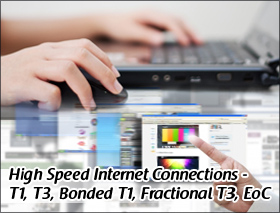Is your Internet T1 Connection dragging you down?
Not long ago, an Internet T1 Connection was considered top of the line for the majority of small and mid-sized businesses. Network admins appreciated the reliability of T1 lines, and employees enjoyed surfing the web at speeds that seemed to be infinitely faster than traditional 56k dial-up connections. Coffee shops and Internet cafes would advertise their T1 connections to draw in more customers. In this context, an Internet T1 connection was presented as the be-all-end-all Internet circuit.
 It is rumored that Bill Gates once said a 512k connection is all the bandwidth anyone would ever need. Oh how times have changed! Due to advancements in technology and business applications, it is crystal clear that is no longer the case. The same revolution of data communications that the T1 line assisted in launching has caused it, paradoxically, to be out-shined.
It is rumored that Bill Gates once said a 512k connection is all the bandwidth anyone would ever need. Oh how times have changed! Due to advancements in technology and business applications, it is crystal clear that is no longer the case. The same revolution of data communications that the T1 line assisted in launching has caused it, paradoxically, to be out-shined.
Today’s businesses rely on high-speed Internet access for mission-critical applications, including marketing, sales, customer service, and customer relationship management applications. Add to that the use of audio, web and video conferencing and it is easy to see why even smaller businesses are requiring more T1 bandwidth.
So what are your next options?
Bonded T1 – Just as its names implies, a bonded T1 provides dedicated service using two or more T1s that are tied together to effectively give a higher capacity line. For example, two bonded T1 lines can provide up to 3 Mbps of data transfer in a single connection; three bonded T1 lines provide 4.5 Mbps, etc., however once you pass 12 Mbps, you’re likely better off with an alternative connection. This bonding is done within Customer Premises Equipment (CPE) that the service provider installs.
Ethernet over Copper (EoC) – Quickly becoming a popular alternative to T1 and bonded T1 lines, EoC uses the same twisted pair telco wiring that provides your T1 lines, but different terminal equipment at your location and at the far end installed in the telco central office (CO). While EoC offers more bandwidth for less cost than other legacy services, it is distance sensitive, and requires users to be within a specific amount of feet from a provider’s CO.
Fractional T3 – Businesses that require more bandwidth than a T1 line can offer, but do not require the full 45 Mbps a full T3/DS3 provides will likely benefit from a fractional T3. The allure of the fractional option is the lower cost and, most importantly, the ease of upgrading.
Full T3 – If your business demands a great deal more bandwidth than a T1 line can offer, a T3 line might be the right solution for you. Also known as a DS3, a single T3 line delivers speeds of up to 45 Mbps. And just like a T1 line, a T3 line can be channelized to deliver voice as well as data.
Additional Information
If you are interested in finding the ideal Internet access solution for your business, give one of our professional account managers a call today!
Image Source: FreeDigitalPhotos.net

